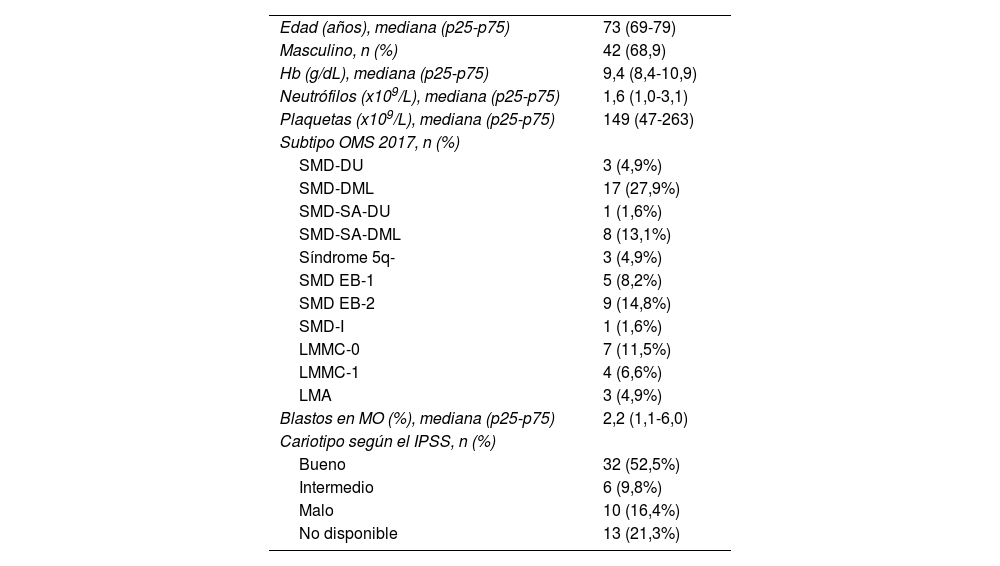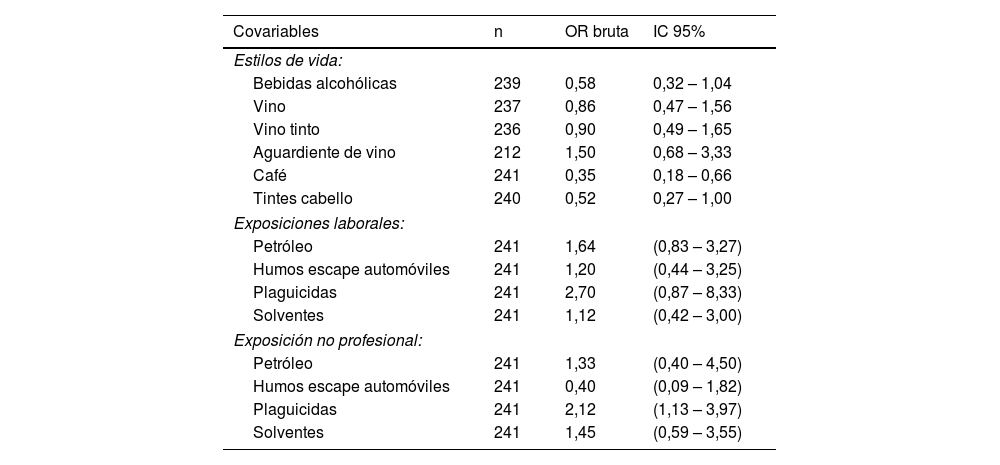Tanto el consumo de cigarrillos (CGS), a través de su papel como fuente de benceno, como determinados polimorfismos en las enzimas de destoxificación metabólica (EDTOX) que dificultan su inactivación, se consideran variables de riesgo para el desarrollo de neoplasias mielodisplásicas (SMD) y procesos relacionados. El objetivo de este estudio es confirmar dichas asociaciones.
Pacientes y métodosSe estudiaron 61 pacientes diagnosticados de SMD según criterios del grupo Franco-Americano-Británico (FAB) y 180 personas mayores de edad, sin citopenias y se analizaron: i) la odds-ratio (OR) bruta de SMD entre fumadores y no fumadores, ii) la OR bruta asociada al diagnóstico de SMD entre los individuos homocigotos para la mutación NQO1609C—T, o portadores de las deleciones en los genes de la GSTM1 y GSTT1 y los que no presentaban dicha configuración genética y iii) la OR asociada al diagnóstico de SMD entre fumadores y no fumadores, una vez ajustada por otros factores de riesgo potenciales.
ResultadosSe ha comprobado la asociación entre los SMD y el consumo de al menos 28 paquetes de cigarrillos-año (OR 3,10; intervalo de confianza [IC] 95% 1,38-6,96). No se observó ninguna asociación entre el genotipo de las EDTOX analizadas y el diagnóstico de SMD.
ConclusionesEl CGS es más relevante que los polimorfismos mencionados en la etiopatogenia de la enfermedad.
Both cigarette smoking (CGS), through its role as a benzene source, and some metabolic detoxyfiying enzymes (EDTOX) polymorphisms that hamper its inactivation, are considered as risk factors for the development of myelodysplastic neoplasms (MDS) and related disorders. This study aims to confirm such associations.
Patients and MethodsWe recruited 61 patients diagnosed with MDS following FAB Group criteria and 180 adults without peripheral blood cytopenia, and we analyzed: i) the crude odds-ratio (OR) for MDS between smokers and non-smokers, ii) the crude OR for MDS between homozygous individuals for the mutation NQO1609C—T, or harboring deletions in the genes codyfing for GSTM1 y GSTT1, and those who did not show such genotypes, and iii) the OR for MDS between smokers and non-smokers, adjusted for other potential risk factors.
ResultsOur data confirm the association between MDS with a 28 pack-year or greater CGS history (OR 3.10; IC 95% 1.38-6.96). Conversely, we did not observe any association between MDS diagnosis and the EDTOX genotypes analyzed.
ConclusionsCigarette smoking history is more relevant than EDTOX genotype in MDS etiopathogenesis.
Artículo
Comprando el artículo el PDF del mismo podrá ser descargado
Precio 19,34 €
Comprar ahora











